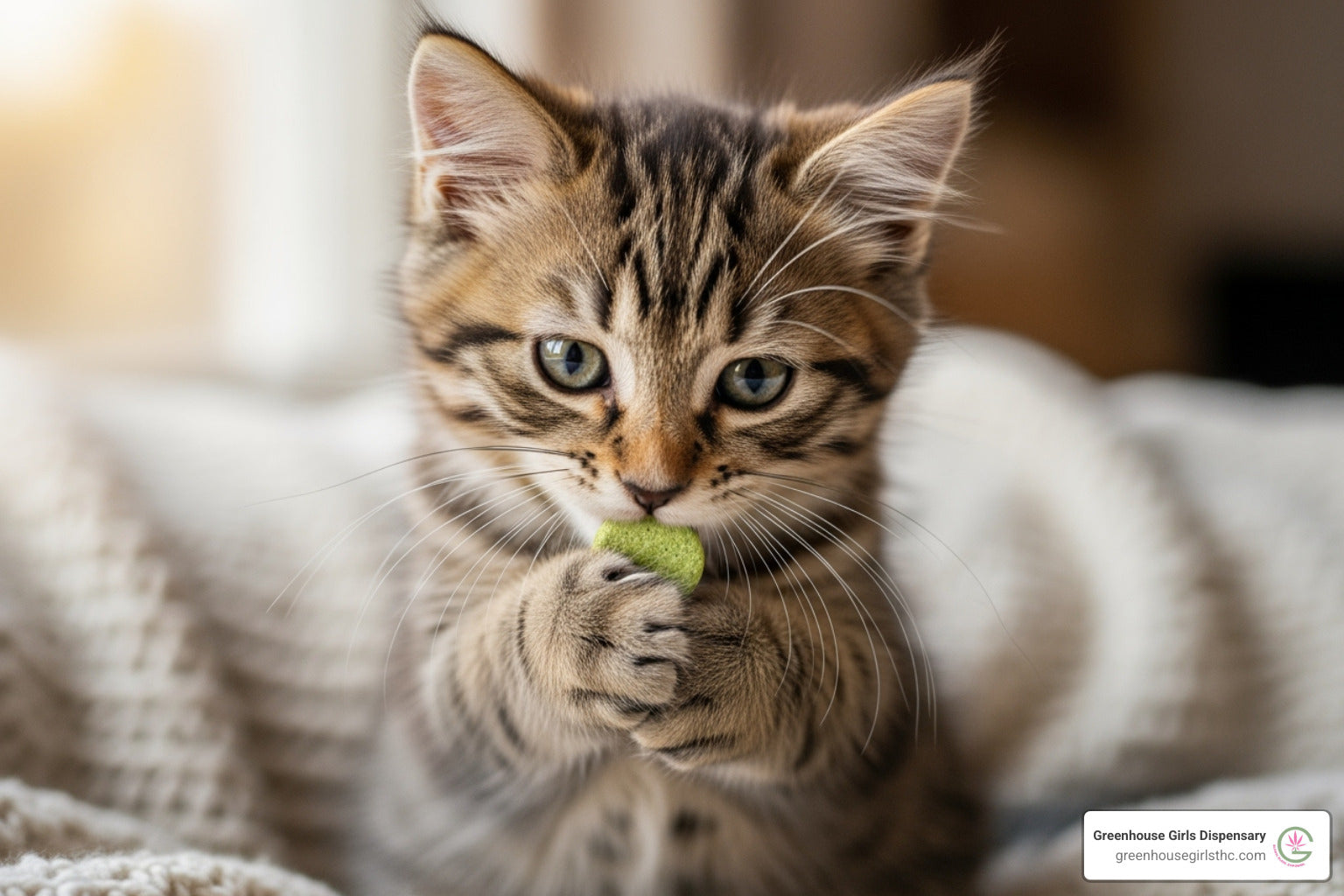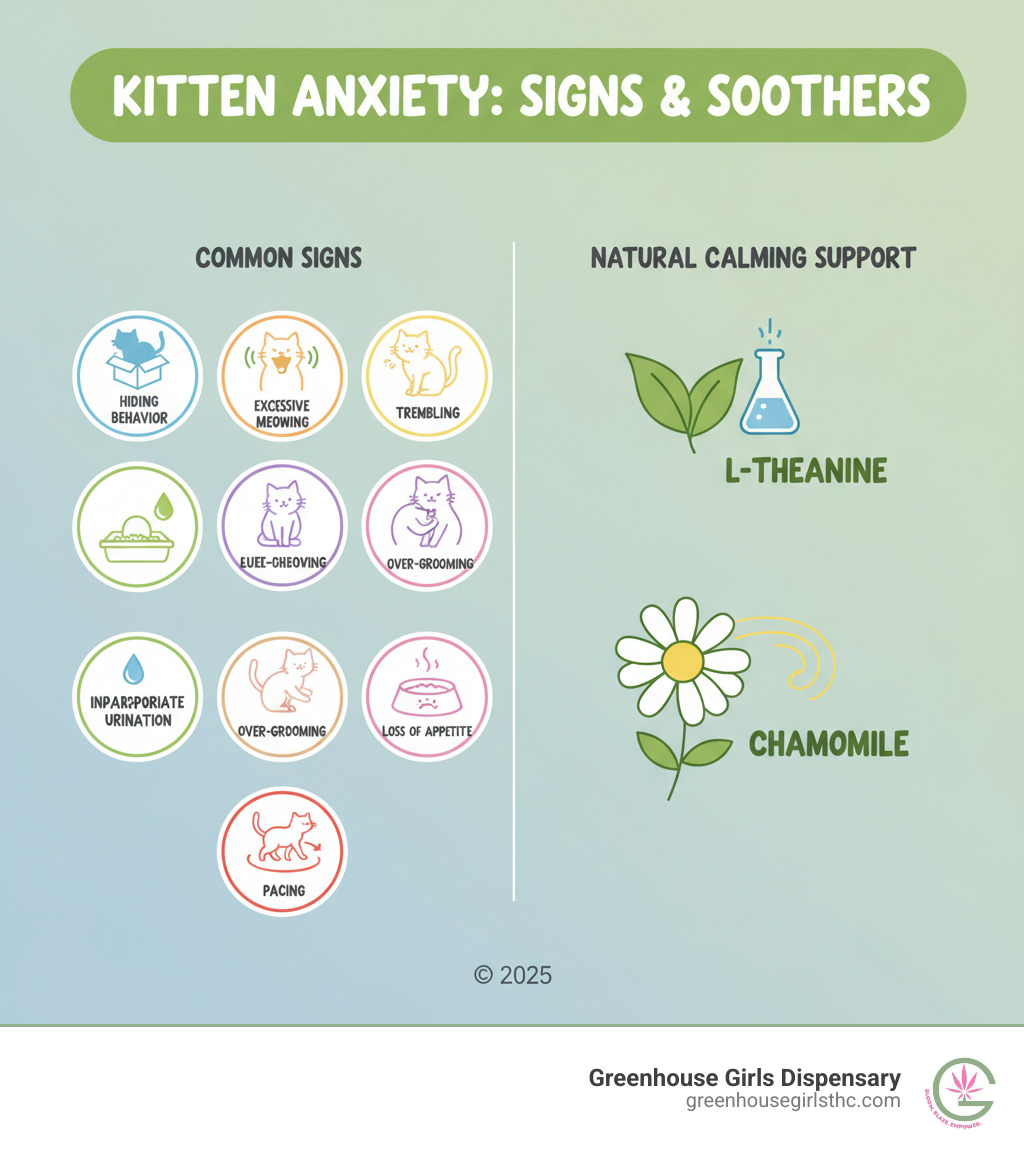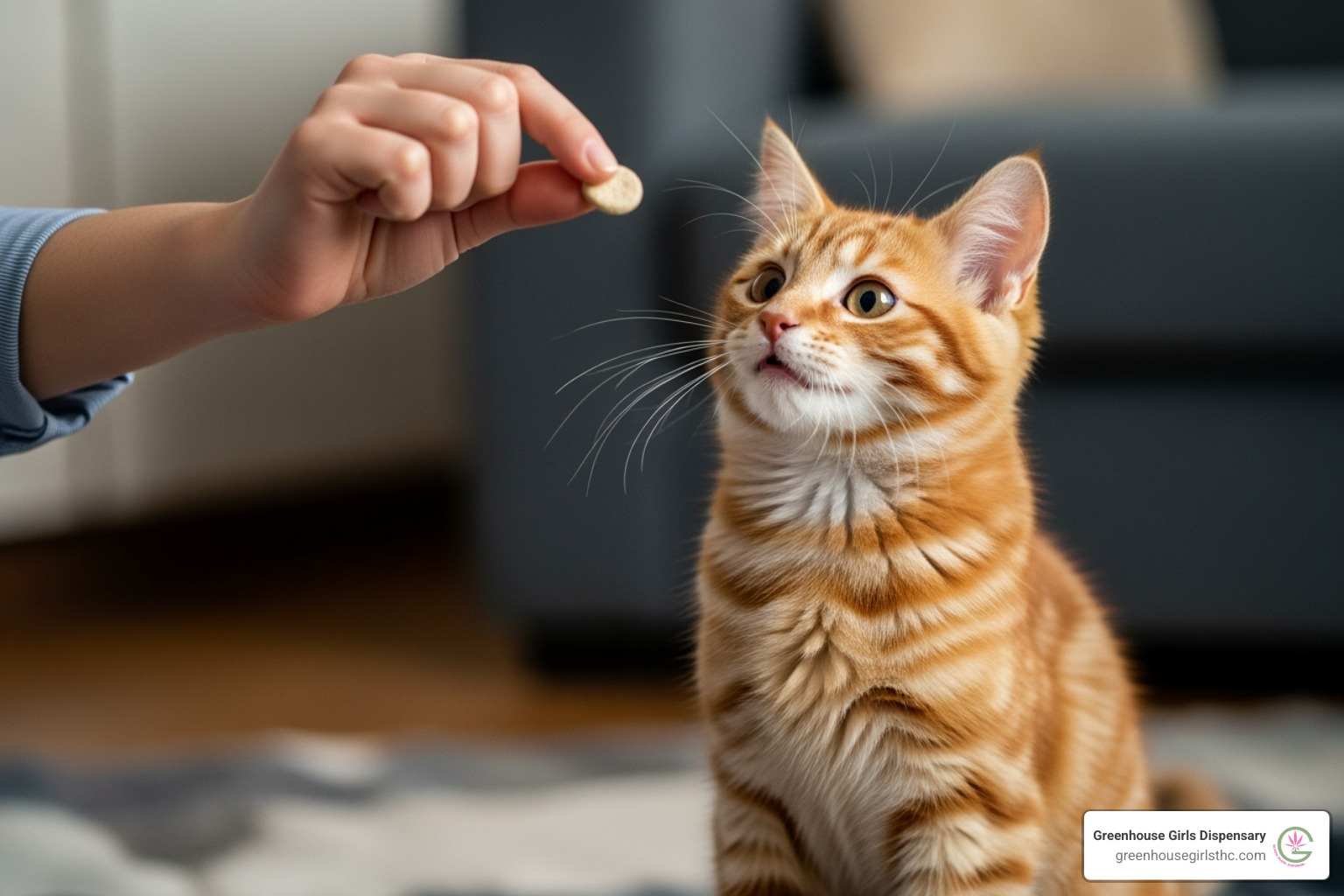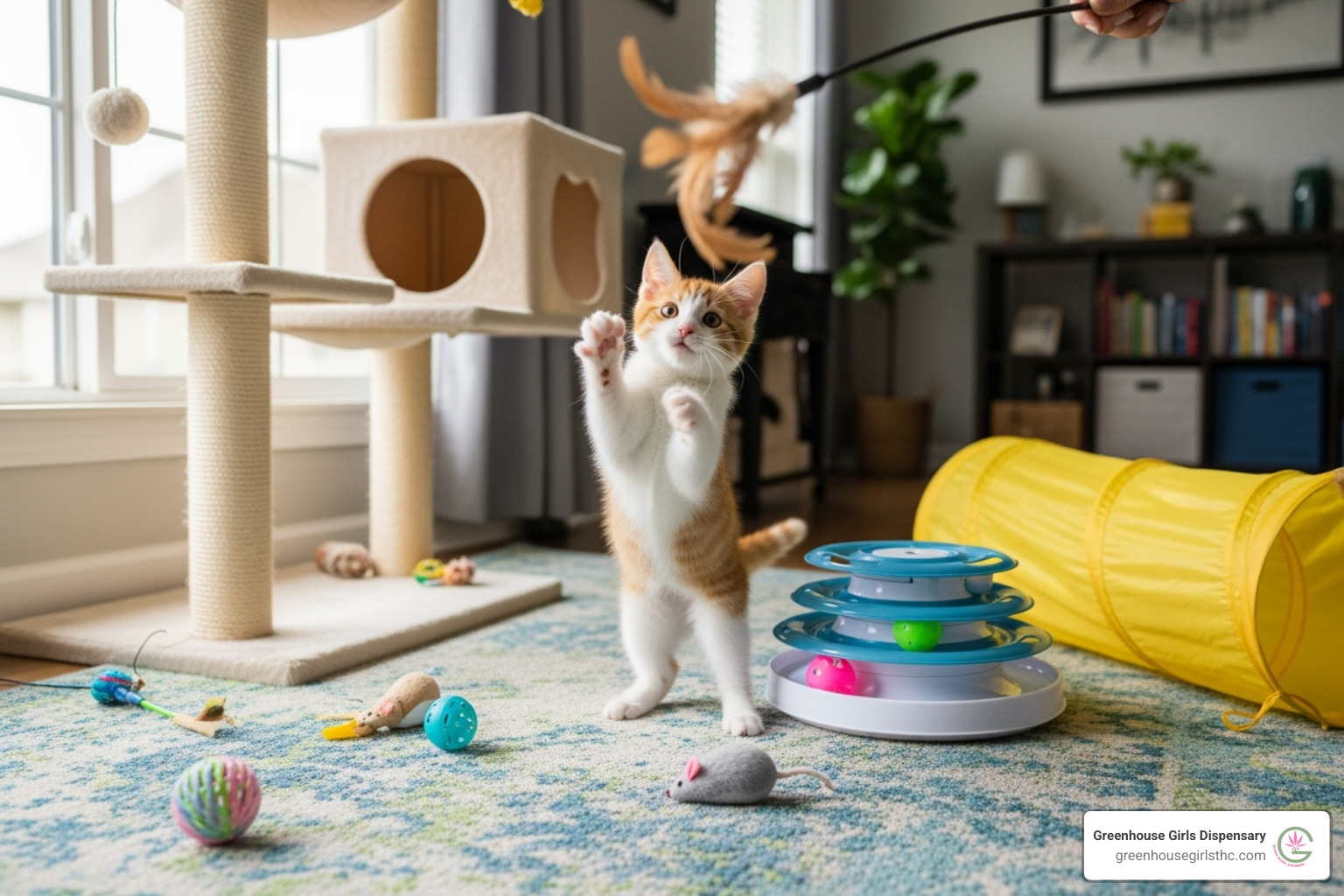
Soothe Your Feline Friend: A Guide to Calming Treats for Kittens
Understanding Your Kitten's Need for Calm
Calming treats for kittens can be a game-changer for young cats facing new environments, loud noises, or other stressful situations. These treats contain natural ingredients like L-theanine, thiamine, and tryptophan to help reduce stress and promote relaxation without drowsiness.
Quick Guide to Calming Treats for Kittens:
- Key Ingredients: L-theanine, thiamine (B1), tryptophan, chamomile
- When to Use: 20-60 minutes before stressful events or daily for general anxiety
- Common Situations: Vet visits, travel, new homes, loud noises, separation
- Safety: Look for kitten-specific formulas and the NASC Quality Seal
- Effectiveness: Results vary; some work in 20-30 minutes, others take weeks
Kittens are curious but easily overwhelmed by changes. Stress from a vet trip, a new home, or household adjustments can lead to hiding, excessive meowing, or inappropriate urination. Natural calming solutions are effective for managing feline anxiety, and many contain proven stress-reducing compounds.
I'm Selena Jochumsen, and my work in wellness and natural products has shown me how the right approach can transform anxious pets. My experience confirms that calming treats for kittens are most effective as part of a holistic approach to feline wellness.

Understanding Kitten Anxiety: Causes and Signs
Your kitten might seem fearless, but they can be quite sensitive to stress. Unlike fear, which is a response to an immediate threat, anxiety is a sustained state of worry that can affect your kitten's daily life. As certified cat behavior consultant Mikel Delgado explains, this prolonged worry can make your little one feel constantly on edge. For more details, you can explore More on cat anxiety from PetMD.
Cats thrive on predictable routines, so when their world is disrupted, they can struggle. Once you learn to recognize the signs and causes of stress, you can help your kitten feel more at ease.
Common Causes of Stress in Kittens
What seems minor to you can feel overwhelming to a small kitten. Here are common stressors:
- Moving to a new home: Adjusting to new smells, sounds, and layouts is a major stressor.
- Loud noises: Thunderstorms, fireworks, and vacuum cleaners can be terrifying due to a kitten's sensitive hearing. Calming treats for kittens can be useful before noisy events.
- Vet visits and car rides: These combine multiple stressors like the carrier, car movement, and handling by strangers.
- Separation anxiety: Kittens with strong bonds may struggle when left alone.
- New family members: A new baby, pet, or frequent visitors can disrupt a kitten's sense of security and territory.
- Changes in routine: As certified cat behavior consultant Marilyn Krieger notes, "A change in routine can be very jarring for a cat." Moving a food bowl or changing feeding times can be unsettling.
- Medical issues: Sudden anxiety without an obvious trigger may signal an underlying health problem, so a vet check is wise.
Recognizing the Signs of an Anxious Kitten
Your kitten communicates stress through behavior. Watch for these clues:
- Hiding: A normally social kitten that suddenly hides is likely overwhelmed.
- Excessive vocalization: Constant meowing or yowling not related to hunger can indicate stress.
- Physical signs: Trembling, shaking, or pacing are clear indicators of distress.
- Inappropriate elimination: Accidents outside the litter box often signal stress.
- Over-grooming: This self-soothing behavior can lead to bald patches or skin irritation.
- Loss of appetite: Anxious kittens might show little interest in food.
- Changes in social behavior: A kitten might become unusually aggressive or withdrawn.
- Restlessness: Hyperactivity, an inability to settle, or destructive behaviors like excessive scratching can be signs of anxiety.
If you notice these signs, your kitten may benefit from support. This is where calming treats for kittens and other strategies can help your little one feel more secure.
How Calming Aids Work: Ingredients and Types
Calming treats for kittens are supplements designed to work with your kitten's biology to promote relaxation. They aren't miracle cures, but they can gently support their nervous system. Every kitten is unique, so finding the right fit is key.
Some aids work quickly for immediate relief, while others build up over time for ongoing support. Understanding the ingredients and types available will help you choose the best option for your feline friend.
Key Ingredients and Their Calming Properties
The effectiveness of calming treats for kittens comes from carefully selected natural compounds:
- L-theanine: An amino acid from green tea that promotes calm without drowsiness by boosting feel-good neurotransmitters. Scientific research on L-theanine's effect shows it can reduce stress-related behaviors in cats.
- Thiamine (Vitamin B1): An essential vitamin that supports healthy brain function and mood regulation.
- Tryptophan: An amino acid that is a precursor to serotonin, the neurotransmitter promoting happiness and relaxation.
- Herbal Ingredients: Chamomile offers gentle soothing properties, while valerian root provides mild sedative effects.
- Colostrum Calming Complex: A proprietary blend from milk containing bioactive proteins that support cognitive function and composure.
- Probiotics: Specific strains like Bifidobacterium longum BL999 can help cats maintain calm behavior by influencing the gut-brain connection. These may take up to six weeks for full effect.
- Melatonin: Regulates sleep-wake cycles and promotes restfulness, useful for travel or schedule changes.
While not a traditional calming ingredient, some pet parents explore CBD. At Greenhouse Girls Dispensary, we are experts in federally legal, lab-tested hemp products. To learn more about CBD for pets, read our guide Can CBD Oil Help My Pet and consult your veterinarian.
Different Types of Calming Aids
Calming treats for kittens come in several forms:
- Soft chews: The most popular option, often flavored with chicken or fish.
- Crunchy treats: Offer a satisfying texture that many cats enjoy.
- Liquid formulas and gels: Ideal for picky eaters or precise dosing, they can be mixed into food or applied to a paw.
- Probiotic powders: Unflavored supplements that sprinkle over food for long-term anxiety management.
- Pheromone diffusers and collars: Environmental solutions that release synthetic calming pheromones.
- Pressure vests: Provide gentle, constant pressure, similar to swaddling, which can be calming for some cats.
- Specialized calming diet foods: Incorporate stress-reducing ingredients into daily nutrition for ongoing support.
Choosing and Using Calming Treats for Kittens
Finding the right calming treats for kittens requires a bit of patience, as not every treat works for every kitten. It's about finding what clicks with your furry friend's needs and preferences.

What to Look for in Calming Treats for Kittens
When selecting a product, prioritize these factors:
- Kitten-specific formulas: Ensure the product is safe for a kitten's developing system. Check age and weight restrictions.
- Natural ingredients: Look for a clean label without artificial colors or unnecessary additives.
- NASC Quality Seal: This seal indicates the company has been audited for quality and consistency by a third party.
- Palatability: The best treat is one your kitten will actually eat. Look for appealing flavors like chicken or fish.
- Calorie content: Be mindful of calories, especially for daily use, to prevent unwanted weight gain.
- Avoid harmful additives: Some ingredients, like lavender essential oil, are toxic to cats. Always check the label.
How to Administer Calming Treats for Kittens: Dosage and Timing
Proper dosage and timing are key to success with calming treats for kittens.
- Follow dosage instructions: Most products base dosage on weight. For example, Vetriscience Composure often recommends one chew for cats up to 15 pounds.
- Start small: Begin with a smaller dose to gauge your kitten's sensitivity and tolerance.
- Read the packaging: Each product has specific instructions regarding timing and whether to give with food.
- Plan for timing: For situational anxiety, give treats 20-60 minutes before a stressful event. Vetriscience Composure may work in 20-30 minutes, while LICKS Zen suggests 30-60 minutes.
- Consider long-term use: Probiotic formulas like Purina Pro Plan Calming Care are for daily use and can take up to six weeks to show full benefits.
- Be creative with administration: If your kitten is picky, try crumbling treats into wet food or placing liquid formulas on their paw to be licked off.
- Consult your vet before increasing dosage: Some products allow for increased doses during stressful times, but always check with your vet first, especially with kittens.
Are the Treats Effective?
To gauge effectiveness, observe your kitten's behavior and be patient.
- Observe behavior: Look for positive changes like less hiding, reduced vocalization, and more playfulness.
- Keep a journal: Note when you give treats and how your kitten behaves to identify patterns.
- Be patient: Fast-acting formulas may work within 30 minutes, but supplements like probiotics need weeks of consistent use.
- Recognize individual variation: What works for one kitten may not work for another. You may need to try different brands or ingredients.
Calming treats for kittens are most effective as part of a broader anxiety-reduction strategy, including environmental changes and consistent routines.
A Holistic Approach to a Calm Kitten
While calming treats for kittens are a great tool, they work best as part of a complete wellness approach that addresses your kitten's physical, emotional, and environmental needs. Combining treats with environmental changes and behavior modification can be transformative.

Potential Side Effects and Safety
Most calming treats for kittens are safe, but it's wise to watch for potential issues:
- Lethargy or drowsiness: This can occur, especially with ingredients like melatonin. If your kitten seems too sleepy, adjust the dosage.
- Digestive upset: Introducing any new supplement can cause mild vomiting or loose stools. Start with a small dose to minimize this risk.
- Allergic reactions: Though rare, watch for scratching, swelling, or breathing difficulties. Stop use and contact your vet if you notice these signs.
Always consult your veterinarian before starting any new supplement. They can identify potential interactions and rule out underlying conditions. Be cautious with ingredients like lavender essential oil, which is toxic to cats.
Combining Treats with Other Calming Methods
Create a full support system for your kitten by combining treats with these strategies:
- Create safe spaces: Provide a cozy, quiet retreat like a cat bed or enclosed cat tree.
- Maintain consistent routines: Predictable feeding, play, and bedtimes help your kitten feel secure.
- Engage in interactive play: Regular play sessions with wands or laser pointers burn off nervous energy and build your bond.
- Try Clicker training: This positive reinforcement method builds confidence.
- Use pheromone products: Diffusers and collars release synthetic calming pheromones.
- Consider pressure vests: The gentle pressure of a ThunderShirt can be very soothing for some cats.
At Greenhouse Girls Dispensary, we are passionate about plant-based wellness. While we specialize in federally legal, lab-tested hemp products for humans—like our popular flower shake deals, gummies, and prerolls—the principles of natural wellness extend to pets. If you're curious about CBD for your kitten, read our article Can CBD Oil Help My Pet and discuss it with your vet.
When to Call the Veterinarian
Professional help is sometimes necessary. Contact your vet if you see:
- Severe anxiety: Behaviors like self-harm (over-grooming to baldness), persistent aggression, or refusal to eat require immediate attention.
- No improvement: If calming treats and environmental changes don't help after several weeks, consult your vet.
- Possible medical issues: Your vet can rule out underlying physical causes for anxiety-like behaviors.
For severe cases, your vet may recommend prescription medications, which can be life-changing under professional supervision.
Frequently Asked Questions about Calming Treats
Navigating calming treats for kittens can bring up many questions. Here are straightforward answers to common concerns.
Are calming treats safe for all kittens?
Most calming treats are generally safe, but safety depends on several factors. Age-appropriateness is key; many products have minimum age or weight requirements (often around 12 weeks) because a kitten's system is still developing. Always read the label for warnings and disclaimers, as some treats may not be suitable for kittens with certain health conditions.
Most importantly, consult your veterinarian before starting any new supplement. They can provide guidance based on your kitten's specific health profile and ensure the product is a safe choice.
How quickly do calming treats work?
The speed of effect varies by product and purpose. Fast-acting formulas with ingredients like L-theanine are designed for situational stress (e.g., vet visits) and can start working in as little as 20-30 minutes. In contrast, long-term supplements, such as those with probiotics for chronic anxiety, may take several weeks of daily use to show their full benefits. Match the product to your needs: as-needed treats for specific events and daily supplements for ongoing management.
Will calming treats make my kitten drowsy?
Most modern calming treats for kittens are formulated to promote relaxation without causing sedation. Ingredients like L-theanine and thiamine are non-sedating, aiming for a calm but alert kitten. The goal is to reduce anxiety, not inhibit their playful nature.
However, treats containing melatonin are an exception, as they are designed to regulate sleep cycles and will likely cause drowsiness. This can be useful for long car rides or helping a kitten settle at night. Proper dosage is crucial to avoid unwanted lethargy, even with non-melatonin formulas. If your kitten seems too sleepy, check the ingredients and consider reducing the dose.
Conclusion
Helping an anxious kitten become a confident companion is incredibly rewarding. Calming treats for kittens offer a gentle, natural way to help your friend steer stressful moments. The benefits of calming treats are maximized when they are part of a holistic wellness plan that supports your kitten's overall health.
The most effective strategy involves creating a calm environment by combining quality treats with consistent routines, interactive play, and safe spaces. This multi-faceted approach gives your kitten the best chance to thrive.
Responsible pet ownership means making informed health choices. Just as we at Greenhouse Girls Dispensary prioritize quality and transparency in our federally legal, lab-tested hemp-derived cannabis products—from our popular flower shake deals and 25MG Delta 9 gummies to our prerolls—you should seek the same standards for your kitten's supplements.
Our commitment to natural wellness extends to our pet-loving community. While we specialize in high-quality cannabis alternatives with nationwide shipping and offer a free Baby Jay preroll or gummy with your first visit, we know pet wellness is also a priority. If you're exploring broader natural options for your pet, including CBD, we encourage you to read our guide: Everything You Need to Know About Pet CBD.
Always consult your veterinarian with any concerns. With the right combination of treats, enrichment, and professional guidance, you can help your kitten live their happiest, most relaxed life.

